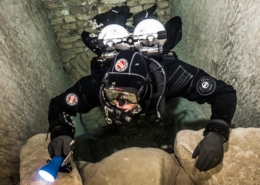That’s Wrong: Technical Diving Misconceptions
By: John Bentley and Brian Shreve
Perusing internet forums on technical diving can be an entertaining way to waste a few moments of a lunch hour, but it’s disheartening to see the amount of misinformation perpetuated online. Just recently, we’ve seen some of these recurring topics, and thought it might make for an interesting article. So what have we seen?
-
I can just do whatever I want for decompression, because it’s only loosely understood.
This one isn’t really a misconception, at least not completely. Decompression theory isn’t thoroughly understood from a physiological perspective. This is being mentioned because the looseness of our understanding is taken as a free pass to bypass the rules. Guess what? Science doesn’t really understand much when it comes to physiological interactions at that level but we still follow the research and data that is available. Saying “it’s just a theory” doesn’t justify aggressive gradient factors, skipped deco, or diving with antiquated versions of tables. While it is true we’re our own crash test dummies on dives that push boundaries, that can’t be taken as carte blanche to do whatever on every dive. There’s a good body of evidence of what works for most technical dives, and a prudent diver will keep within that range of ascent strategies.
-
CNS loading isn’t a real thing
People, more and more, seem to devalue CNS tracking for repetitive decompression just because they know of explorers pushing 500% of their CNS clock. This shows a clear lack of understanding to the actual value of that percentage and what it represents. 100% does not mean “CNS toxicity happens here.” 100% is a recommended value over a period of time. Sometimes that value is pushed further and done so successfully with specific considerations being met. The fault here is probably the units (percentage) chosen to represent this loading. We’re used to 100% being the maximum in a dataset, while the time variable in CNS loading makes that not the case. Just because 100% is typically used as a maximum value and can be surpassed significantly does not mean that the idea of a max CNS load is invalid. Divers doing repetitive decompression dives with accelerated deco should be tracking their CNS and should stop waylaying data in favor of anecdotes and conjecture.
-
Buoyancy control and trim
“If I’m not in a cave trim, it isn’t a big deal”
Really? No. If an open water student can be horizontal in the water you can too. Vertical diving comes from a time of over-weighted technical divers whose equipment literally wouldn’t let them be trim. Now, with balanced rigs and standardization of gear it’s simple to be flat in the water. There really isn’t a good excuse for this anymore, especially considering that SDI instructors are consistently producing entry level scuba divers with horizontal trim.
-
Helium doesn’t require a full class, it’s just a new gas
Hopefully this is only a popular one among the internet divers, which is where it’s seen the most. A helium class’s necessity coming in question really shows the lack of respect towards years and years of fatalities and accident analysis. Helium is different. We’re all glad you have Google and read something about isobaric counter diffusion. The skill sets developed in a trimix/advanced trimix course, and the evaluation of those skills, is a vital part of a self-regulated industry. Your self-evaluation is important before a course, but the idea that self evaluation and an exam makes a trimix diver is not valid nor is it supported.
While talking to your favorite internet diver don’t forget to take wild anecdotal evidence with a heaping grain of salt. Training, experience and research make a great instructor as well as a great diver. Those two things can’t be replaced by marginalization of facts and data that appease egos and mitigate hard work.










Deixe uma resposta
Want to join the discussion?Feel free to contribute!